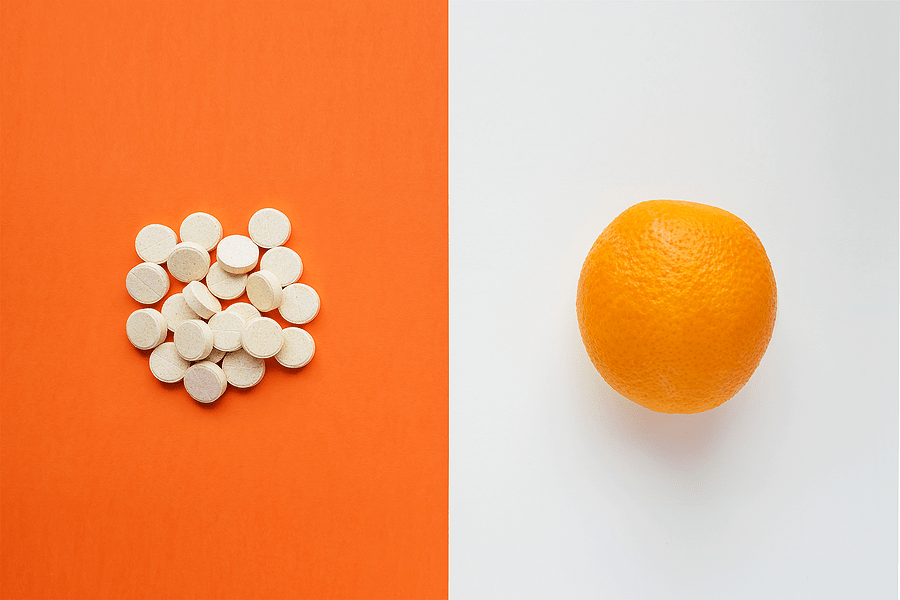
Whole-Food & Synthetic Nutritional Supplements
Whole-Food and Synthetic Nutritional Supplements: Is One Better than the Other?
A fresh, whole-foods diet is the optimal way to obtain nutrients. However, environmental conditions and farming practices have depleted the soil of key nutrients we would typically obtain from food, making it impossible to get everything we need from food alone. One example of this is magnesium which is needed in over 300 chemical reactions in the human body. It is estimated up to 68% of Americans don't get enough magnesium due to absorption issues, lack of Vitamin D, cooking methods, and even medication use can contribute.
Nutritional supplements provide a way to support the body's needs. In the United States, more than 170 million Americans (76% of the adult population) take at least one supplement with the most popular being a multivitamin. Overall, there are two broad categories of supplements to choose from - whole food-based and synthetic (lab-created). Is one better than the other?
What the Research Says
Regrettably, there aren't many studies comparing whole-food supplements to synthetic varieties. Whole-food supplement manufacturers claim their products are superior, but there is no specific criteria to define "whole food" in the supplement market. Many different practices can be used to claim a supplement is whole-food. Some brands do add concentrated fruits and vegetables to their product. Others simply add yeast and use a fermentation process. Does this make a supplement more available to the body for absorption? Not necessarily.
From the research available, we know the bioavailability of a nutrient depends on many factors including:
- a person's state of health
- the proper production of stomach acid necessary for vitamin absorption
- whether or not the supplement is digested in the stomach; pills that pass through the stomach are less bioavailable
- the supplement manufacturing process
The only way to measure bioavailability for comparison purposes is to do blood tests, and there is simply not enough valid and reliable research that makes such comparisons.
Whole-Food Vs. Synthetic Supplements: What is Best for You?
Of course, better digestibility and assimilation by the body are important factors for anyone considering nutritional supplements. The bottom line is that either type of supplement may be better than the other depending on the reason it's being taken (for general health or a specific medical need) along with the factors mentioned above. In some cases a truly food-based supplement could be the better choice, but not always. The best way to ascertain your need for supplements is to consult with a natural medicine physician who understands the manufacturing practices for nutritional supplements, as well the physiology of how different types of nutrients work in the body.
Dr. Blandford, a naturopathic physician based in Rockford, MI, has educational training and clinical experience around supplements. Contact her today for a FREE 15-minute consultation to find out if naturopathic medicine is right for you. Additionally, she also offers a nutritional consultation where she can help you evaluate your current supplements and their quality.
References
1) ScientificAmerican.com "Do vitamins in pills differ from those in food?" Accessed 17 July 2020: https://www.scientificamerican.com/article/do-vitamins-in-pills-diff/
2) Gahche J, Bailey R, Burt V, et al. "Dietary supplement use among U.S. adults has increased since NHANES III (1988-1994)." NCHS Data Brief. (2011) 61):1-8.
3) Thiel, RJ. "Natural vitamins may be superior to synthetic ones." Med Hypotheses. (2000) 55(6):461-469. doi:10.1054/mehy.2000.1090 https://www.sciencedirect.com/science/article/abs/pii/S0306987700910909?via%3Dihub
4) Bae YJ, Bu SY, Kim JY, et al. "Magnesium supplementation through seaweed calcium extract rather than synthetic magnesium oxide improves femur bone mineral density and strength in ovariectomized rats." Biol Trace Elem Res. (2011). 144(1-3):992-1002. doi:10.1007/s12011-011-9073-2
5) Burton GW, Traber MG, Acuff RV, et al. "Human plasma and tissue alpha-tocopherol concentrations in response to supplementation with deuterated natural and synthetic vitamin" E. Am J Clin Nutr. (1998) 67(4):669-684. doi:10.1093/ajcn/67.4.669
6) Council for Responsible Nutrition. "2017 CRN Consumer Survey on Dietary Supplements". https://www.crnusa.org/resources/2017-crn-consumer-survey-dietary-supplements
7) Schwalfenberg GK, Genuis SJ. The Importance of Magnesium in Clinical Healthcare. Scientifica (Cairo). 2017;2017:4179326. doi:10.1155/2017/4179326 Accessed on 1 Feb: https://www.ncbi.nlm.nih.gov/pmc/articles/PMC5637834/

Leave a Comment
(0 Comments)